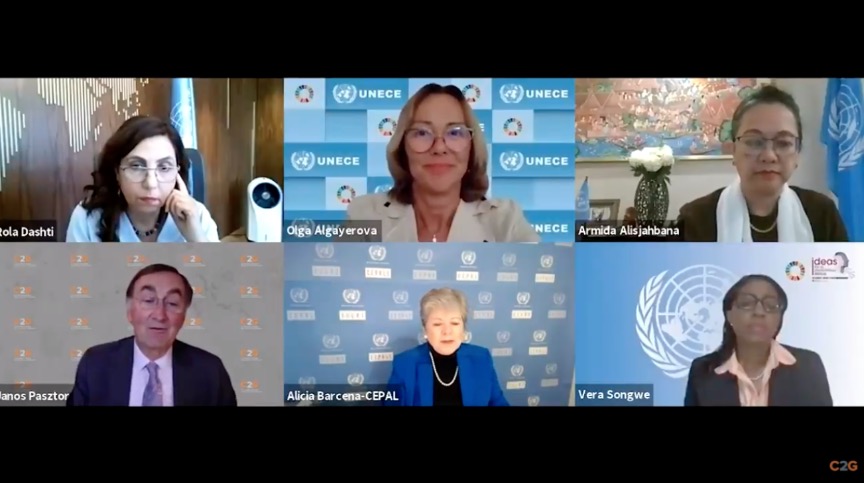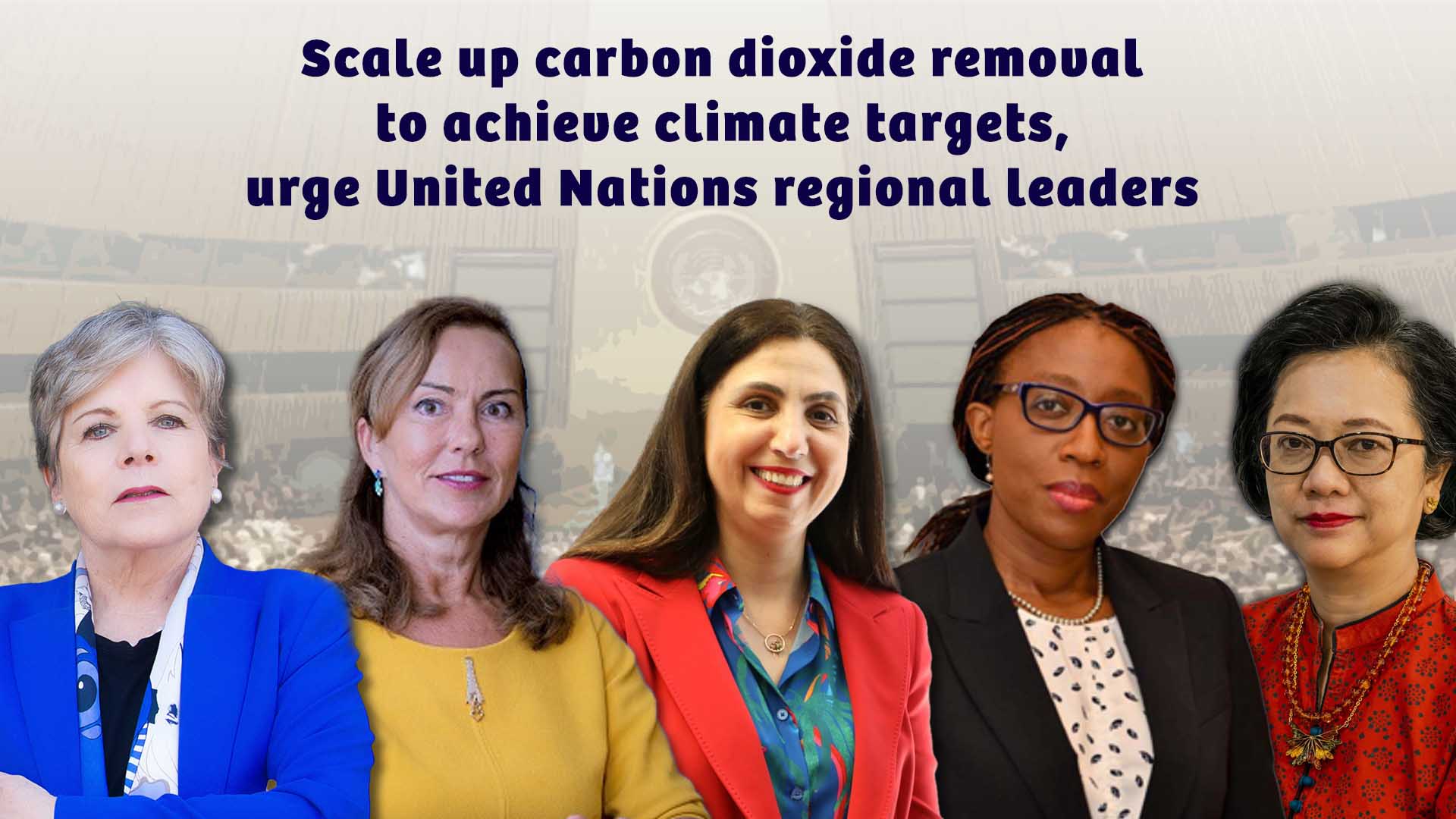Climate Change Impacts Require Action Not Only at a National Level but also at a Regional and Global Level, ECLAC Stresses
Work area(s)
At a side event to the UN High-level Dialogue on Energy, the organization’s Executive Secretary, Alicia Bárcena, highlighted the transformative sectors that help with carbon dioxide removal.

“The impacts of climate change require action not only at a national level, but also at a regional and global level. We have options, but we must understand which ones are national, regional or global,” Alicia Bárcena, Executive Secretary of the Economic Commission for Latin America and the Caribbean (ECLAC), stressed today during a side event to the UN High-level Dialogue on Energy that is taking place this Friday, September 24 in the framework of the global organization’s 76th General Assembly.
The event, entitled Challenges and Opportunities for Harnessing Climate & SDG Synergies: the role of carbon dioxide removal, was organized by the Carnegie Climate Governance Initiative (C2G) and consisted of a dialogue between the Executive Secretaries of the five United Nations Regional Commissions: Alicia Bárcena, Executive Secretary of ECLAC; Olga Algayerova, Executive Secretary of the Economic Commission for Europe (ECE); Armida Salsiah Alisjahbana, Executive Secretary of the Economic and Social Commission for Asia and the Pacific (ESCAP); Rola Dashti, Executive Secretary of the Economic and Social Commission for Western Asia (ESCWA); and Vera Songwe, Executive Secretary of the Economic Commission for Africa (ECA). The discussion was moderated by the Executive Director of C2G, Janos Pasztor.
At the event, the senior United Nations officials discussed the different approaches for carbon dioxide removal (CDR) with the aim of tackling climate change and reducing the gas emissions that affect the planet, along with the policies and investments needed at a national and regional level to achieve the climate and energy targets agreed upon internationally, in the context of implementation of the 2030 Agenda’s Sustainable Development Goals (SDGs) and the Paris Agreement.
In her remarks, Alicia Bárcena indicated that today we are confronting a very fragmented world. “We have identified major asymmetries in access to vaccines, the impacts of climate change and in financing for development,” she stated.
She added that developed countries – especially the United States, Europe and China – are investing enormous resources in the transformation of their economies, channeling investment into infrastructure and energy in particular. “In our region (Latin America and the Caribbean) that is not the case. Many countries face fiscal constraints due to the crisis. That is why we propose very concrete areas for transformation that can help with carbon dioxide removal and enable a transition towards more inclusive and sustainable economies,” she said.
These areas are: the energy transformation, to shift the matrix towards renewable energy; electromobility; the bioeconomy and nature-based solutions; the circular economy; and sustainable tourism.
“We have calculated the costs and benefits in some sectors. For example, the energy matrix’s conversion to renewable energy would cost 1.3% of the region’s annual GDP, would create seven million jobs and would reduce emissions by 30% by 2032,” she specified.
“With regard to the actions that we are suggesting to fight climate change and reduce carbon emissions, it is important to stress that we cannot work with the environmental sectors alone. We must also consider the economic sector and articulate public and private investments towards environmentally sustainable sectors, thereby contributing as well to the SDGs. But they must do so simultaneously, meaning contribute to growth while also creating jobs and reducing emissions,” Bárcena explained.
In terms of carbon dioxide removal (CDR), the Executive Secretary listed seven actions needed in this realm: afforestation and forest ecosystem restoration; Bioenergy with Carbon Capture and Storage (BECCS); land restoration and enhancing soil carbon content with biochar (charcoal); enhanced weathering of rocks for carbon capture in soils; increasing ocean alkalinity to increase carbon uptake; Direct Air Carbon Dioxide Capture and Storage (DACCS); and ocean fertilization to accelerate the growth of phytoplankton.
Furthermore, Alicia Bárcena warned that global financing is going to mitigation of climate change, but in Latin America and the Caribbean, in addition to mitigation, we need resources for adaptation. “That is why we are not making enough progress,” she indicated.
“The investment rate in our region is 17.6% of GDP, while the global average is 26.3% and in developing economies and emerging markets it rises to 32.9%. Political commitment is key for moving ahead on the energy transition and on sectors like electromobility and the circular economy,” she added.
Finally, Bárcena highlighted the role that the United Nations regional commissions can play in engaging in a discussion in each region with different actors, beyond the environmental sector. “We need to bring to the table energy, environment and finance ministers and civil society as well, because many people still do not understand that climate change is a global problem, not just a local one. We must connect people and communities to find solutions to these problems. Also we must include global actors, such as the World Bank and the International Monetary Fund, and the private sector” and “have spaces in Latin America and the Caribbean to discuss the regional implications of global action for carbon dioxide removal,” she emphasized.
Related content

Scale up carbon dioxide removal to achieve climate targets, urge United Nations regional leaders
In a joint statement, the Executive Secretaries of the United Nations Regional Commissions have called for enhanced regional cooperation to develop nature-based and technological solutions for…
Type
Country(ies)
- Africa
- Latin America and the Caribbean
- Asia
- Europe
Related link(s)
Contact
Public Information Unit
- prensa@cepal.org
- (56 2) 2210 2040